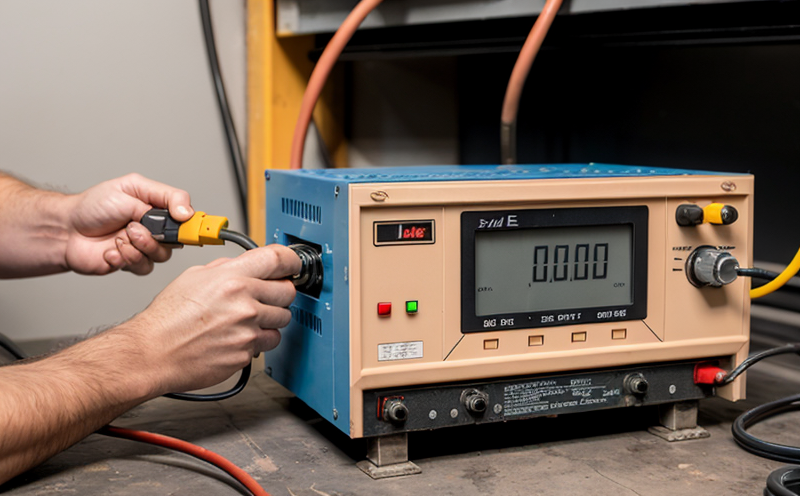ASTM F1780 Die Line Width Electrical Characterization Testing
The ASTM F1780 standard provides a comprehensive approach to die-level electrical characterization focused on line width and its impact on performance. This test is critical for ensuring that semiconductor devices meet the stringent requirements of modern electronic systems. The process involves detailed analysis of the electrical properties of very narrow lines within microchips, which are essential components in advanced integrated circuits.
The ASTM F1780 test procedure is designed to evaluate how variations in line width affect device performance and reliability. This is particularly important as semiconductor technology continues to advance, with devices becoming smaller and more complex. The ability to accurately characterize these fine lines ensures that the final product meets both functional and quality specifications.
The testing involves a series of steps aimed at providing precise measurements of electrical characteristics under controlled conditions. These include:
- Preparation of the die samples for testing
- Setting up the test environment to simulate real-world operating conditions
- Application of various stimuli to observe and measure responses
- Data collection and analysis to determine compliance with specified standards
- Reporting results in a format that can be used by quality managers and engineers for decision-making
The precision required in this testing is paramount, as even small changes in line width can significantly impact the overall performance of the chip. The ASTM F1780 test ensures that manufacturers have reliable data to improve their processes and ultimately deliver higher-quality products.
One of the key challenges in performing such tests is maintaining consistent environmental conditions throughout the process. This includes temperature control, humidity levels, and electromagnetic interference (EMI). These factors can influence the results, making it essential to adhere strictly to protocol. The testing equipment used must also be capable of providing accurate measurements at extremely fine scales.
The ASTM F1780 test is widely recognized for its role in quality assurance within the semiconductor industry. By using this standard, manufacturers can ensure that their products meet not only internal specifications but also external standards set by regulatory bodies and international organizations.
This level of detail is crucial when dealing with cutting-edge technologies where even minor deviations could lead to significant failures or inefficiencies. The ASTM F1780 test helps prevent such issues by providing a robust framework for evaluating die-level electrical characteristics.
Why Choose This Test
Selecting the appropriate testing method is vital when it comes to ensuring the quality and reliability of semiconductor devices. Here are several reasons why choosing ASTM F1780 Die Line Width Electrical Characterization Testing for your product development process makes sense:
- Enhanced Product Quality: By identifying potential issues early in the design phase, you can improve overall product performance.
- Cost Efficiency: Early detection of problems reduces the need for costly post-manufacturing repairs or rework.
- Regulatory Compliance: Ensures adherence to international standards like ASTM F1780, which is essential for global market access.
- Increased Customer Satisfaction: High-quality products lead to better customer satisfaction and loyalty.
- Innovation Support: Advanced testing methodologies drive innovation by allowing manufacturers to explore new boundaries in technology.
- Data Reliability: Consistent results from standardized tests provide reliable data for informed decisions.
- Process Improvement: Identifying weaknesses helps refine manufacturing processes, leading to better outcomes.
The ASTM F1780 test is particularly beneficial because it focuses on a specific but critical aspect of semiconductor design—line width. This focus ensures that any discrepancies are addressed promptly before they become more significant issues down the line.
Customer Impact and Satisfaction
- Improved Product Performance: By ensuring accurate electrical characterization, the ASTM F1780 test enhances the reliability and performance of semiconductor devices.
- Better Customer Relationships: Satisfied customers are more likely to recommend your products and services positively.
- Increased Market Share: Superior quality can attract new customers and retain existing ones, thereby increasing market share.
- Competitive Advantage: Meeting or exceeding industry standards sets you apart from competitors who do not adhere to these strict protocols.
Customer satisfaction is directly linked to the quality of the products they receive. By choosing ASTM F1780 Die Line Width Electrical Characterization Testing, manufacturers can ensure that their customers are receiving top-notch components and assemblies every time. This commitment to excellence fosters trust and loyalty among clients.
International Acceptance and Recognition
The ASTM F1780 standard has gained widespread acceptance across the semiconductor industry worldwide due to its rigorous testing procedures and consistent results. Many leading companies in this field use this method as part of their quality control processes because it aligns with global standards for excellence.
- ISO 9001: Compliance with ISO 9001 certification demonstrates a commitment to continuous improvement and customer satisfaction.
- IEC 62368-1: This international standard ensures that products meet safety requirements, promoting user confidence in the quality of the product.
- EN 50173: Used primarily in Europe, this standard covers power supply equipment and is recognized for its stringent technical specifications.
The ASTM F1780 test's international recognition means that it can be used confidently across borders. This uniformity helps facilitate trade between countries while ensuring consistent quality standards are maintained regardless of location. Organizations that adopt these practices contribute to an environment where trust and reliability are paramount.





